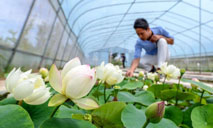China committed to helping world eliminate vaccine divide
GENEVA, June 2 (Xinhua) -- The World Health Organization (WHO) on Tuesday validated China's CoronaVac vaccine for emergency use, the second Chinese vaccine approved by the WHO.
The validation means China's vaccines will play a greater role in helping the world eliminate the vaccine divide that is impeding global efforts to curb the COVID-19 pandemic.
Unlike some developed countries which are hoarding vaccines, China has been taking concrete steps to deliver on its promise to make Chinese vaccines a global public good, and implementing with practical actions the concept of a global community of health for all.
So far, China has provided vaccine assistance to more than 80 developing countries and exported vaccines to more than 50 nations, an unremitting effort to help the international community bridge the "immunization gap" generated by inequity in vaccine distribution.
China, being a responsible global player, has been promoting a more equitable global vaccination campaign, as the vaccines China offers to the world have been proved accessible, effective and safe.
High accessibility is a distinctive feature of the two WHO validated Chinese vaccines, the Sinopharm vaccine and the CoronaVac vaccine.
According to the Chinese pharmaceutical company Sinovac, producer of the CoronaVac vaccine, since August 2020, the company's production lines have run on a 24/7 mode to meet domestic as well as global demand. At present, Sinovac's production capacity of the COVID-19 vaccine exceeds 2 billion doses annually, supplying nearly 40 countries and regions globally.
Meanwhile, scientific review results by the WHO's Strategic Advisory Group of Experts on Immunization show that the Sinopharm vaccine's efficacy for symptomatic and hospitalized disease was estimated to be 79 percent, while the Sinovac vaccine prevented symptomatic disease in 51 percent of those vaccinated and prevented severe COVID-19 and hospitalization in 100 percent of the studied population.
In terms of safety, there is currently no clear evidence showing any safety problems of the two vaccines. WHO Director-General Tedros Adhanom Ghebreyesus said on Tuesday that the CoronaVac vaccine has been given WHO Emergency Use Listing after being found to be "safe, effective and quality assured following two doses of the inactivated vaccine."
Moreover, easy storage and transport are additional key advantages of the two Chinese vaccines. Theoretically, Sinopharm and Sinovac vaccines can be stored at conventional refrigerator temperatures, meaning that the existing vaccine cold chain system and even household refrigerators can meet the storage requirements.
Sinovac said experimental results show that its vaccine can be stored at 25 degrees Celsius for 42 days, at 37 degrees Celsius for 21 days, and between an estimated 2 to 8 degrees Celsius for a "very long time," providing favorable conditions for the vaccine's storage and transportation.
Such advantages can greatly enlarge the scale of vaccination in developing countries where conditions of ultra-low temperatures are hard to meet. As Lu Mengji, professor at the Institute of Virology of the University Hospital of Essen in Germany, noted, "for countries with limited resources of medical technology, inactivated vaccines have a great advantage when it comes to putting into use. It will play an important role in the global fight against the pandemic."
Photos
Related Stories
- Over 660 mln COVID-19 vaccine doses administered across China
- AU says COVID-19 vaccine hoarding aggravates inequitable access
- China's vaccination campaign may "accelerate" Asia's recovery from pandemic: U.S. media
- Over 620 mln COVID-19 vaccine doses administered across China
- 1 million Hong Kong residents fully vaccinated against COVID-19
Copyright © 2021 People's Daily Online. All Rights Reserved.










